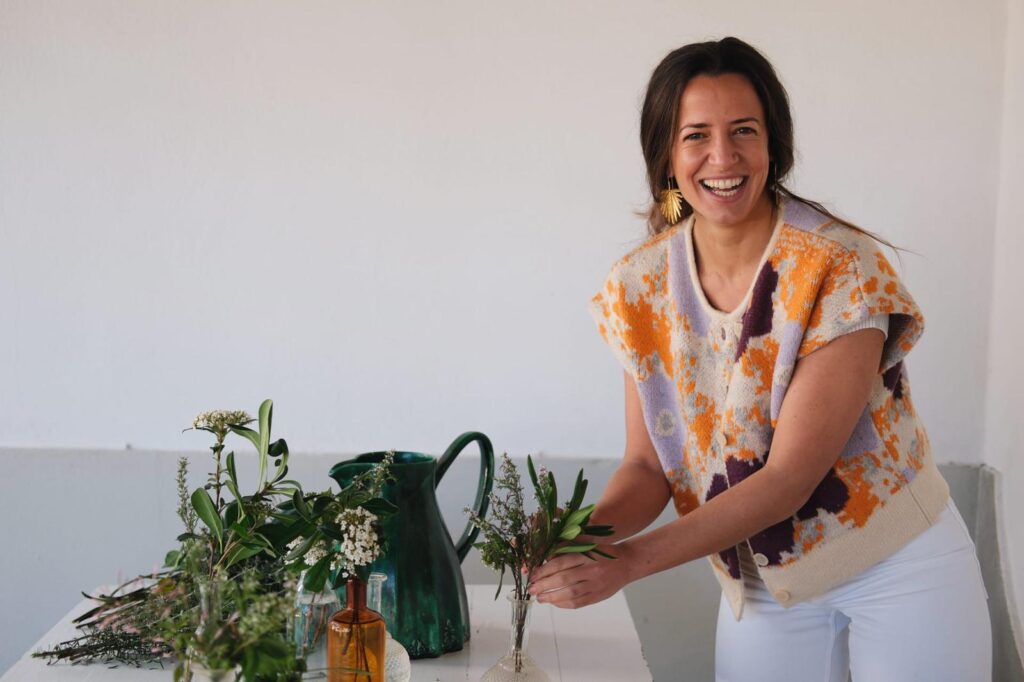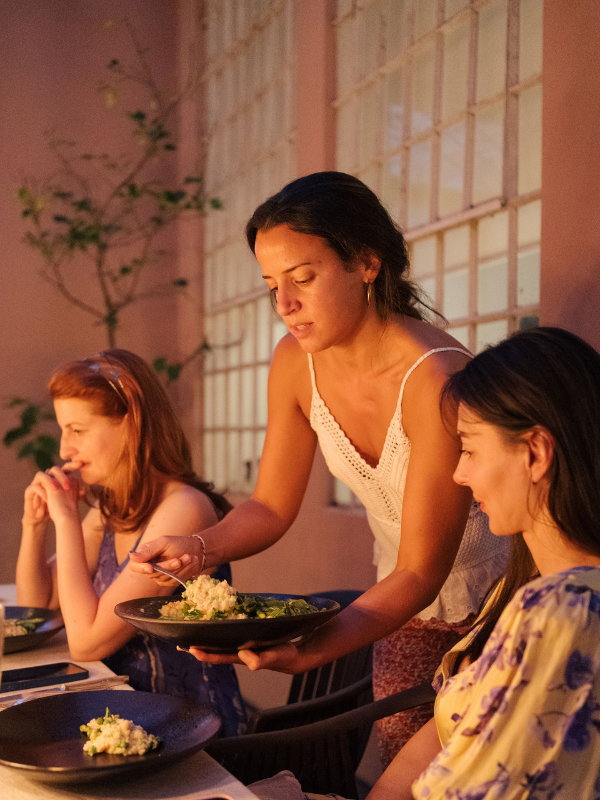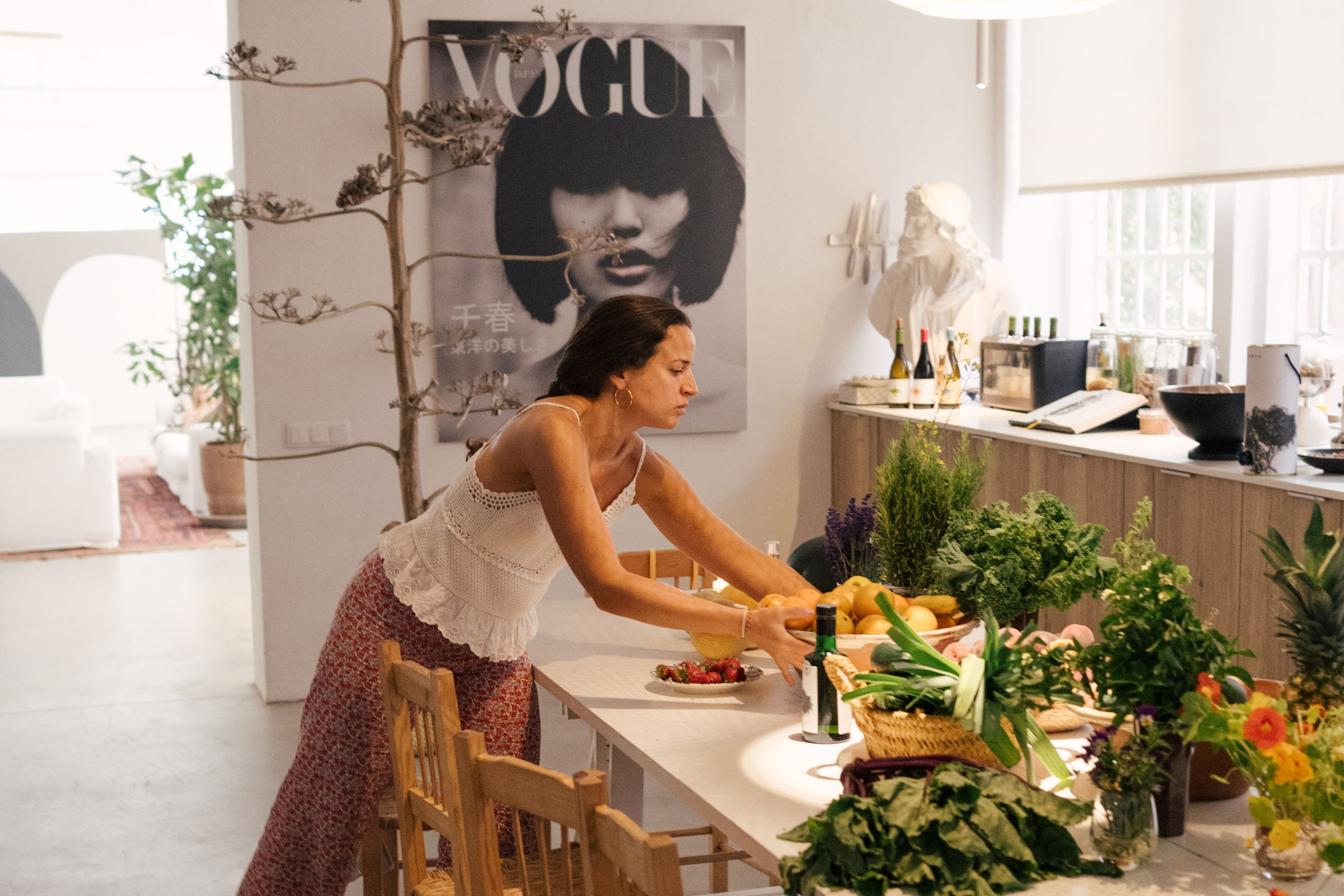
A Plant-Powered Culinary Journey with Joana Limão
As a plant-based chef and food stylist, how do you approach combining flavors, textures, and presentation in your dishes to create unique and memorable culinary experiences?
I strive for balance and harmony. Whether the combinations are classic or irreverent, they always need balance to ensure our palates experience pleasure and joy, which is what I consistently aim for.
Visually, the plants themselves, along with their shapes, colors, and elements, provide my inspiration. I tend to be very intuitive with the presentation of my dishes, but automatically always think about how that dish will be eaten, being careful about the details like when there’s a hot and cold element or if something crispy won’t become soggy when too close to the sauce, etc.
How do you stay up-to-date with current food trends, and how do you incorporate these trends into your plant-based creations?
On the one hand, I follow some chefs and creators, but on the other, I confess following trends is not a topic that concerns me a lot. I do try to know more and more about plant-based cooking and using vegetables to the best of their potential, but social media trends don’t dictate my work.
I perceive a significant collective effort towards cooking more with plants, returning to our roots, making and eating fermented foods, drawing inspiration from natural elements, and reducing waste in our kitchens. I love to follow the work of chefs from restaurants around the world to gain inspiration and drive.
Can you share your thoughts on the connection between food, culture, and sustainability, and how you aim to promote these values through your work as a plant-based chef and food stylist?
I draw great inspiration from our ancestors, simple folks who truly understood the connection between food, culture, and sustainability.
All around the table, they ate locally and seasonally (“not too much, mostly plants” like Michael Pollan suggests to this day), together they told stories flooded with deep wisdom, they used the resources conservatively because they depended on them, so they didn’t want them to be scarce.
So in this sense, I believe the way to enhance this connection is to lead a simpler life.
It’s not always possible, and there’s no perfect goal to attain, but just a few steps toward sustainability taken by more people (the collective) will already make a big difference in our footprint on the planet.

What challenges have you faced in your journey as a plant-based chef, and how have you overcome them to continue pushing the boundaries of plant-based cuisine?
Perhaps the most prominent challenge was not being taken seriously by fellow cooks and chefs, a concern that doesn’t bother me as much anymore, as nowadays good vegetarian restaurants are more common, healthy plant-based dishes are a bit everywhere even in fine dining – that makes me so happy and confident!
Another challenge would probably be the clients when they ask “Won’t we be hungry?”, or in the end when they say “Oh, it was really delicious, it didn’t even seem vegan!” – overall myths and pre-conceptions about what it is to eat plant-based. You can eat delicious food and feel very satisfied!
On a more logistical level, I work by myself and don’t have a production kitchen, so that has sometimes been a challenge, although with time I’ve also learned what challenges I want to take on and which ones aren’t for me.
Can you describe your creative process when developing new recipes or styling food for photoshoots? How do you stay inspired and innovative in your work?
Honestly, it’s not something highly structured that I can break down into steps or bullet points. I’m very guided by – first the briefing of course! – my intuition, what I feel will pass the message and tell the story in the best way.
Styling is a very fun work, especially when you’re given creative freedom and trust. When the job is more commercial, like a pack shot, an outdoor, or a marketing campaign, it has more rules, we need to be very careful about every tiny detail from grains of rice to the water drops on an apple.
Inspiration comes from everything around me. I believe it is really important to travel, go to restaurants, read books, and magazines, know who’s doing what and where, go to concerts, art exhibitions and to the theater.
Know what’s available at your local market. Where do ingredients come from? How does your farmer cook at home? What did your grandma eat when she was little? How is food faced in other cultures, in other religions, in other families?
I ask so many questions all the time, staying curious is key.
As a plant-based chef and food stylist, what is your ultimate vision for the future of food and how do you hope to inspire and encourage others to embrace more sustainable and compassionate eating habits?
I strongly believe that the path is and will be to incorporate more and more plants – real food, real ingredients – less animal products and, when so, with a focus on sustainability – wild-caught, pasture-raised, organic meat always, raw cheeses, etc.
I envision tight communities, connections to the farmers, and even supermarkets sharing their suppliers more transparently.
I hope the culture of food brings celebration, and gratitude for the abundance given to us and diminishes guilt around meals or certain dishes. Health is above all in the mind and I think food culture – and especially diet culture – should have that in mind.
With my work, I try to share inspiration and a warm invitation to consider trying eating this way, at least a couple meals per week to start with.
Show people that it can be easy, fun, and delicious to eat plant-based, seasonal, and local.
Can you share a story or experience from your journey that inspired you to follow your passion for plant-based cooking and food styling, and how it has positively impacted your life?
After the Culinary Arts diploma, I worked in a renowned restaurant in Lisbon, but I was deeply frustrated, I had terrible eating hours – and living hours in general ha! – worked standing all the time and the work environment and workload just weren’t good.
I understood that being healthy wasn’t just getting thinner for Summer like I’ve seen the women in my family do each year.
It struck me that healthy = balance, happiness, and lightness in most areas of life. At least for me.
It struck me that I needed to change professions, stop working 14-hour shifts, and find something that allowed me to keep on living apart from just work; start eating in balance, working out with moderation, and resting with quality.
I left the restaurant business eight years ago and have been working as a freelancer ever since! 🙂
What key lessons have you learned along the way that you wish you had known when you first started pursuing your passion for plant-based cooking and food styling?
There’s a quote that has resonated with me for years – If it’s not a hell yes, it’s a no – it’s kind of my mantra when I need to decide if I accept or refuse one job, or when I’m creating an event or retreat.
I’ve realized that what comes from my heart usually goes very well, what I launch out of need, greediness, or from a place of fear/lack usually never sells. So I’m really careful when putting things out or sharing content from brands that I love, use, and support.
If it’s a no, I follow my gut. Even if it promises money, recognition, or whatever it may be – it’s just not my door to walk in. Other opportunities will come that feel more aligned with me.
How do you recommend others explore their creative interests and passions, especially if they’re unsure of where to begin or how to get started?
I usually say: Just start! Of course, you’ll fail – we all do, all of the time! – and it is OK! We often fear failure, but that’s precisely when we learn the most.
And with learning a new skill or leaning into a new creative interest comes so much room for improvisation and improvement, it’s quite magical!
Allow yourself to figure it out as you go, surround yourself with a good teacher, and just let it flow.

In your experience, what role do persistence and resilience play in pursuing a creative career, and how can others develop these traits to help them achieve their goals?
Even though persistence and resilience are major qualities to develop as a human being, and I deeply value them, I have to say I’m not the biggest hustler (even though I work for myself), nor do I agree with the hustling culture, working long hours, dismissing other areas of life over work-all-the-time.
Persisting too much when something isn’t working might mean missing a valuable lesson hidden in the struggle. In my opinion, it is so necessary to hold space and time for what’s coming in our direction.
Nowadays, before I keep on pushing, I ask myself if what I’m doing is coming from my heart and soul, what my why, and how can I see things from another perspective. Also, I give myself time to rest, to step away from the project even if just for a day, and then come back to it with fresh eyes.
How has embracing your passion for plant-based cooking and food styling changed your perspective on success, and what advice do you have for others who may be struggling to define their version of success?
To me, success is being able to rest, pay my bills of course, but actually carving time for myself, my own life out of work. That has always been so important for me. I don’t live for work, I live for life itself, for knowing myself, for creating memories with my crowd, for sunny beach days, and for cold evenings by the fireplace.
For me, success is defined by the ability to be relaxed, calm, and grateful for what I have.
Can you share any resources, books, or influencers that have inspired you in your journey and that might be helpful for others looking to ignite their creative spark?
This question instantly brings to mind “Artist’s Way” by Julia Cameron, a must-read to boost your creativity, even if you don’t consider yourself creative. Also, Elisabeth Gilbert’s “Big Magic” is such an inspiration.
All the videos, talks, and podcasts from Brené Brown.
More recently, the workbook from Rupi Kaur “Healing Through Words”.
Also, from two Portuguese siblings, creators of the Ask Game, the Ask Journal – a planner and organizer with one question per day to make you go deeper in all areas of your life – just brilliant! You can find it here.
Lastly, what message would you like to share with individuals who are hesitant to pursue their passions or are unsure of how to take the first steps toward living a more creative and fulfilling life?
If I may, let me pose a few questions to the reader:
My dear, envision yourself a bit older, or a lot older: 90 years young. You’re looking back on your life, your dear family and the friends you made along the way, your proudest achievements, and your lowest lows.
You realize that your passions are still alive within you, but you no longer have the strength to bring them to life. The timing slipped away. After all, it was your responsibility to make the most of this life you’ve been given 🙂 How does it feel to know you didn’t follow your passion? How does it feel to know you didn’t live to your full potential? How does it feel to be unfulfilled?
Do you want to reach the end of your life with these feelings?
If not, what’s one small action you can realistically do this week to turn your passion into a reality?